Listen to these comments I’ve heard from four individuals, each in a different troubled marriage.
Wife A: “It’s gotten to the point where I can’t take it anymore. I’ve got to start thinking of myself. I’m totally unhappy as his wife.”
Husband B: “After twenty-six years of no affection, I’ve had it. If just once she would warmly reach over and show an interest in giving me pleasure, I could stick it out.”
Wife C: “I just don’t feel alive anymore . Somewhere along the line I died. He thinks that the only reason I exist is to supply him with food, sex, and clean shirts. I’ve got to break out of this coffin.”
Husband D: “I’m not sure why, but life doesn’t mean much anymore. I love my wife, but not the way I used to. The spark just isn’t there. Everything seems so boring. There’s got to be more to life than this.”
No one would quarrel with the observation that these folks are hurting. Each one is feeling real pain. They are angry, scared, empty, frustrated, and sometimes desperate.
Most caring people would want to find some way to relieve their pain, to give immediate attention to their wounded hearts.
Many counselors would agree. The most important thing to do is to heal their wounds: Build up self-images, uncover dynamic forces within personalities that block the free expression of identity, break patterns of co-dependency, help people erect boundaries between themselves and others that protect them from negative influences and provide them with enough space to grow. A thousand strategies exist for helping people feel better about themselves.
But notice something else, something that seems almost unkind to point out, something so terribly obvious that we might pass right over it. The four spouses regard their hurt as the most important problem. They are committed, first of all, to themselves.
Each one, without blushing, holds fast to an overriding concern for his or her own well-being. Other things may matter, but nothing matters more than their own happiness and personal satisfaction.
When I talked with these four men and women, it became clear that not one thought of his or her self-centeredness as a serious problem. When each thought about this commitment to self at all, it seemed not only as natural as breathing, but entirely justified.
What is wrong with these wives and husbands, and countless others like them, who know very little of the enjoyment marriage is supposed to provide? Is the core problem the personal damage that patterns of poor relating have produced? Are they wounded victims in need of healing? Or is there a problem within that is worse than whatever wounds they carry? Is there a self-interest that is not healthy and normal but destructive and wrong?
Desiring our own good is not sinful in itself, but natural and instinctive. God gave us everything, even our very existence. He wants us to take care of what he gave us. It is the act of putting ourselves at the center of the universe, where God belongs, that is unqualified sin. This is, in fact, the very definition of sin.
Self-Interest
When self-interest continues as the dominant commitment of our lives, when we devote our energy to serving ourselves above all others, then we are wrongly self-centered. And this form of self-interest is a far more serious and dangerous problem than the wounds we suffer at the hands of others.
But very few people even notice their commitment to self- interest, and among those who do, even fewer are deeply concerned about it. More often, self-centeredness is encouraged:
“Look out for yourself . Who else is going to?” “You shouldn’t have to put up with that kind of treatment .” “You must learn to take care of yourself before you can properly give to others.”
All relationships, even the best ones, have hard, disappointing moments. And when we are treated unfairly, an energetic determination to recover some measure of personal comfort seems reasonable and thoroughly justified. Nothing is more natural, especially when we suffer from wounds caused by unjust treatment from another, than to regard our immediate well-being as the final purpose justice should serve.
People are wounded, and people are self-centered. We must decide which is the greater problem.
The wounds of men, in some ways, are different from the wounds of women . In marriage, men complain more of sexual frustration, and women hurt more over the lack of sensitive involvement . Differences like these need to be explored and understood to help us give more meaning- fully to one another . But neither men nor women are naturally inclined to give of themselves on behalf of others . Those who rightly insist on the equality of both sexes would do well to begin by insisting that men and women are equally fallen and are therefore equally committed to advancing their own interest . Whatever our similarities and differences, men and women are bound up in a self-centered approach to life that can be dislodged only by an ongoing encounter with a forgiving and gracious God . We will not move very far in our efforts to develop good marriages until we understand that repairing a damaged sense of identity and healing the wound in our hearts is not the first order of business . It is rather dealing with the subtle, pervasive, stub- born commitment to ourselves.
Self-centeredness is the killer. In every bad relationship, it is the deadliest culprit . Poor communication, temper problems, unhealthy responses to dysfunctional family backgrounds, co- dependent relationships, and personal incompatibility—every- thing (unless medically caused) flows out of the cesspool of self-centeredness.
Before we can begin to talk about putting marriages together, before we can properly discuss the differences between men and women and how they can be enjoyed, before we can recover from our wounds, we must deal with our common problem of self-centeredness in a way that transforms us more and more into
Taken from Men and Women, Enjoying the Difference by Larry Crabb.
Copyright © 2013. Used by permission of Zondervan. www.zondervan.com












